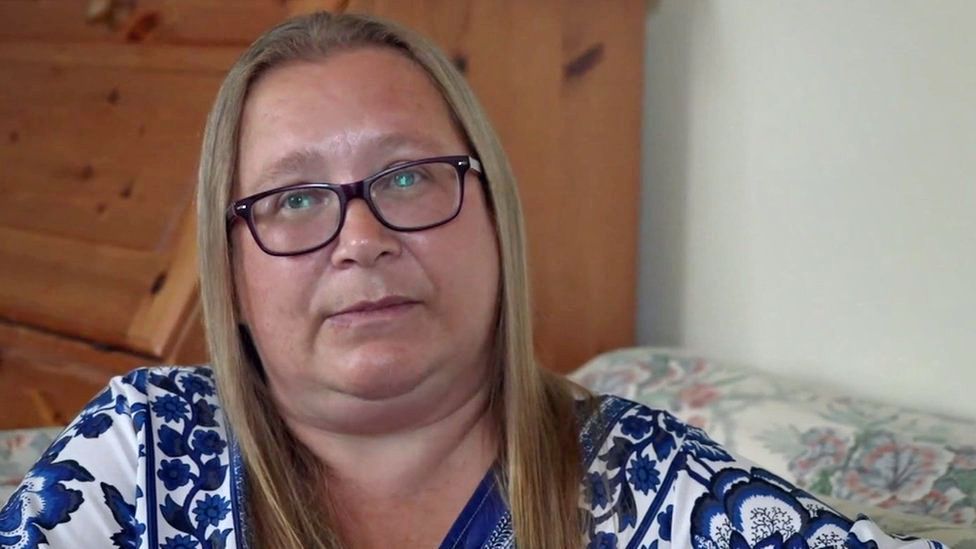ARTICLE AD BOX

'It's been made very clear to me that having teenage sons isn't the ideal,' says Sara
By Alison Benjamin & Harriet Agerholm
BBC News
Thousands of adverts for rental homes posted by private landlords and lettings agents say children or pets are not welcome, BBC analysis shows.
There are no laws explicitly stopping this, but MPs are considering more protections for renters in England.
Under existing equality laws, blanket bans on children have been shown to indirectly discriminate against women.
A single mother of three told the BBC she was shocked many of the properties she looked at specified no children.
"I suppose they think that they're going to have wild parties, or that they're messy, but my children aren't like that," said Sara from Sussex.
Estate agent body Propertymark said a government cap on deposits in England made landlords more wary of damage - specifically in relation to pets.
The National Residential Landlords Association said it recognised how important pets were to many tenants and that any bans on children reflected "the actions of a minority of rogue landlords".
BBC News created software that collected private rental listings from property websites OpenRent and Zoopla over a four-day period in May, then removed adverts for rooms in shared accommodation.
- Almost one quarter (24%) of OpenRent adverts showed a preference that said families were not allowed to rent the homes - about 1,800 of just under 8,000 in our sample
- Over 300 Zoopla listings explicitly said children were not wanted, although this was less than 1% of those we looked at
- Some 73% of sampled OpenRent listings said tenants with pets were not welcome, compared with 6% on Zoopla
OpenRent - an online agent - allows landlords to tick a preferences box to specify whether children and pets are welcome, whereas Zoopla listings are posted by property agents and only sometimes mention the subject.
Housing charity Shelter said the full scale of the issue was not clear, because it was only after enquiring about a property than prospective tenants were told they were not welcome.
'My son needs security'
Single parent Sara, who has three children aged between 15 and 23, said it was a shock that so many of the properties she was looking at near Lewes in East Sussex stated that no children were allowed, including teenagers.
The 53-year-old and her son Jake, 15, have been sofa-surfing - leaving him feeling "very unsettled".
"It's been made very clear to me that having teenage sons isn't the ideal," she said.
She said that being in receipt of housing benefit also made landlords and agents reluctant to let to her.
Proposed changes to the law for renters do not include any policy on children in private rental housing, although the government has promised to bring forward legislation on the issue in England "at the earliest opportunity".
The Scottish government said in a statement that reform of the private rental sector was needed and it had consulted on a new strategy that included launching a housing regulator for the sector.
Nearly 200 agents - or 2% of the Zoopla adverts we analysed - explicitly said children were not welcome.
The Property Ombudsman, which helps settle rental disputes, said in March that blanket bans on renting to families breached its code of practice because they disproportionately affect women, who are more likely to live with their children.
"It's already unlawful under the Equality Act to have an outright blanket ban on renting to families because this is a type of indirect discrimination," said Rose Arnall, a solicitor at Shelter, who represented the tenant in the case.
Blanket bans on tenants with children in Wales and Scotland were also a likely breach of the Equality Act, Shelter said.
Caroline Brosnan, a senior lawyer at Russell Cooke, said a landlord needed to consider whether not allowing children would stand up in court.
While it would be reasonable to stop children living in a residence such as a bedsit in accommodation with multiple occupants, justifying a ban in a semi-detached house would be much more difficult, she said.
Can you challenge a ban on children?
Renters in England can challenge a letting agent that says children are not permitted in private rental property, says Shelter.
This is when an agent refuses to rent you a property that is suitable and affordable, just because you have children.
Before a complaint is made, you must show you can afford the rent, and check the property is a suitable size.
If a complaint is unsuccessful, it is possible to take it to the Property Ombudsman or the Property Redress Scheme.
Blanket bans on tenants with children in Wales and Scotland were also a likely breach of the Equality Act, Shelter said, while in Northern Ireland there are various equality laws that could be relevant.
Those living in Northern Ireland who suspect they have been denied a tenancy because of their dependents can make a complaint with help from the charity Housing Rights.
About one in six lettings agents in the Zoopla listings we analysed were advertising properties that explicitly banned tenants with pets.
Under the Renters (Reform) Bill, being considered by Parliament, tenants would be given the legal right to request to keep a pet in their home, which the landlord cannot unreasonably refuse.
Animal lover Sarah Plant said she had never encountered problems renting with her two cats when she lived in France, but struggled in the UK.
Image source, Sarah Plant
Image caption,Smidge's owner says owning cats has made finding a home more difficult
She said that when she told lettings agents about her cats she said she would "never hear back, it's an instant no".
She eventually found somewhere, but it was a place that needed some work.
Adam Hyslop, OpenRent's founder, told the BBC that allowing landlords to show their preferences helped renters prioritise their searches.
"The decision of who to let to is entirely with the landlord. We also do not prevent tenants from enquiring about any property," he said.
A Zoopla spokesperson said over 95% of rental listings on Zoopla "make no reference to homes being unsuitable to pets or children".
"We're unable to find clear evidence that agents are adopting blanket bans when uploading rental listings to Zoopla which would be in breach of guidance."
Any agent that lists on Zoopla must abide by both its code of conduct and the law and the website recommends agents use "inclusive language and avoid marketing homes as unsuitable for a certain type of renter", it said.
Propertymark said the BBC's findings showed the importance of professional property agents because "blanket bans on advertising materials through a letting agent are demonstrably lower when compared with adverts by private landlords".
Method
BBC News created software to collect over 120,000 rental listings from Zoopla and 11,000 from OpenRent advertised between 26-29 May. We then removed house shares and homes marketed as retirement properties from both samples.
Our analysis of OpenRent adverts relied on its site design, which used tickboxes to welcome or exclude families and pets.
Adam Hyslop, OpenRent's founder, said the BBC's approach of looking at a static snapshot of listings "is not likely to be accurate" due to more popular property listings spending less time on the website.
OpenRent is an agent where listings can be cross-posted to Zoopla, so before analysing Zoopla adverts we removed any cross-posted OpenRent posts. We then used lists of common terms such as "no pets" and "no children" to filter listings.
Additional reporting by Maryam Ahmed and Jo Mathys
Are you a landlord or a tenant? Have you been affected by the issues raised in this story? You can share your experiences by emailing haveyoursay@bbc.co.uk.
Please include a contact number if you are willing to speak to a BBC journalist. You can also get in touch in the following ways:
If you are reading this page and can't see the form you will need to visit the mobile version of the BBC website to submit your question or comment or you can email us at HaveYourSay@bbc.co.uk. Please include your name, age and location with any submission.

 1 year ago
103
1 year ago
103








 English (US) ·
English (US) ·